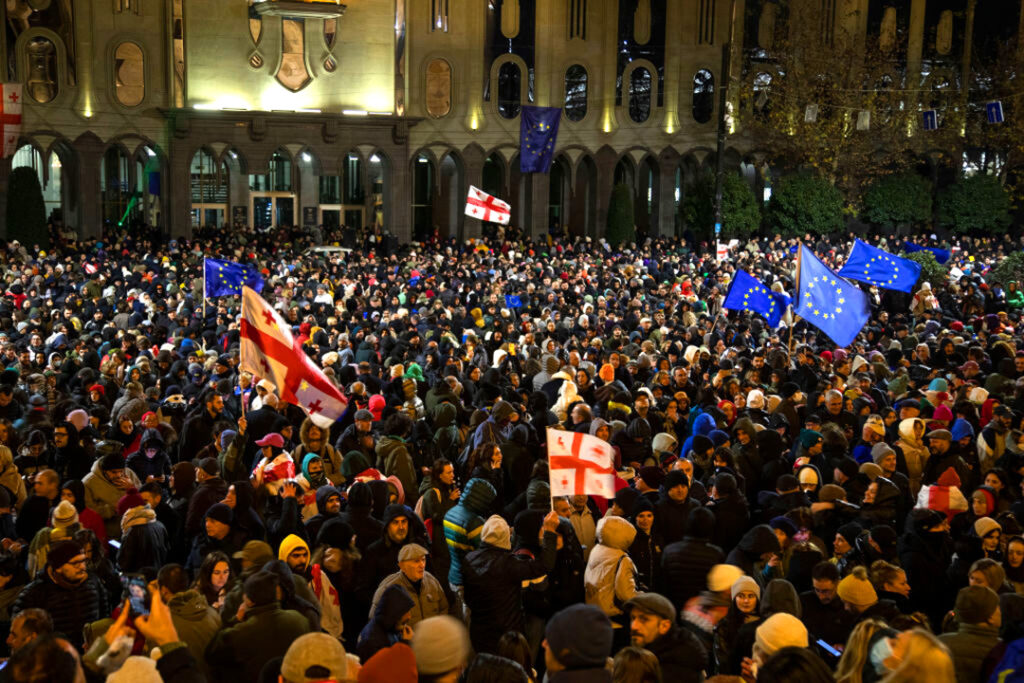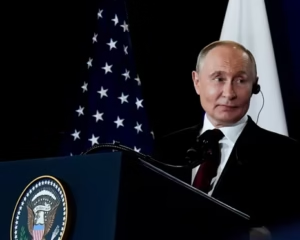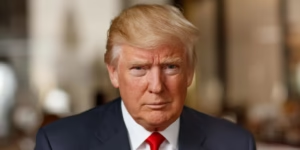Georgian President Declares Parliament Illegitimate Following Pro-EU Protests

TBILISI, GEORGIA - NOVEMBER 28: People gather in protest outside the parliament on November 28, 2024 in Tbilisi, Georgia. Protesters gathered outside the Georgian parliament in Tbilisi after Georgian Prime Minister Irakli Kobakhidze announced Thursday that he is suspending the South Caucus nation's bid for EU membership until the end of 2028, following a European Parliament resolution that deemed October's parliamentary elections as invalid. The country's president, Salome Zourabichvili, alleges last month's parliamentary election, which was won by the ruling Georgian Dream party, was "stolen" amid Russian interference. (Photo by Daro Sulakauri/Getty Images)
Georgian President Salome Zourabichvili has declared the government illegitimate and stated she would remain in office beyond her term, which ends next month. This declaration came amid growing political unrest in Georgia, following the controversial announcement by Prime Minister Irakli Kobakhidze’s Georgian Dream party. The party stated it would halt European Union (EU) accession talks for the next four years, citing what it referred to as “blackmail” from the EU. This abrupt reversal of Georgia’s long-standing ambition to join the EU triggered widespread protests across the country.
EU membership has been an overwhelmingly popular goal in Georgia, and the suspension of talks was seen as a betrayal by many. The move caught many by surprise, especially since Georgia’s constitution clearly states the country’s aim to join the EU. In response to the government’s decision, mass protests erupted, particularly in the capital, Tbilisi, where demonstrators expressed their outrage over the reversal. Protesters voiced their strong opposition to the government’s stance, which they felt undermined Georgia’s European aspirations.
In her address , President Zourabichvili, a staunch critic of Georgian Dream and a pro-EU advocate, declared that the parliament elected in the recent October 26 election was illegitimate. Zourabichvili, whose presidential powers are largely ceremonial, argued that the parliament, which secured almost 54% of the vote for Georgian Dream, had no authority to elect her successor when her term ends in December. She emphasized that, “There is no legitimate parliament, and therefore, an illegitimate parliament cannot elect a new president.” As a result, she vowed to remain in office until a legitimate parliament is established through fair elections.
Zourabichvili’s comments came in response to accusations from Prime Minister Kobakhidze, who claimed that the opposition’s rejection of the halt to EU accession was part of a plot to instigate a revolution, drawing parallels with the 2014 Maidan protests in Ukraine that led to the ousting of a pro-Russian president. Kobakhidze firmly rejected the possibility of such a revolution taking place in Georgia, stating, “In Georgia, the Maidan scenario cannot be realised. Georgia is a state, and the state will not, of course, permit this.”
Meanwhile, protests in Tbilisi escalated, with demonstrators setting up barricades along Rustaveli Avenue, one of the capital’s main streets. The protests turned violent as demonstrators clashed with riot police, throwing fireworks and other objects at law enforcement. In response, the Interior Ministry reported that 107 people were detained during the protests. Riot police used tear gas and water cannons to disperse the crowds, which continued to gather late into the night. The presence of riot police was significant, as protests showed no signs of abating.
The opposition to the government’s decision to freeze EU accession has received support from various sectors of Georgian society, including officials in the foreign, defense, justice, and education ministries, as well as the central bank. In addition, Khvicha Kvaratskhelia, a well-known player on Georgia’s national football team, voiced his solidarity with the protesters, sharing his distress over the violence. On social media, he urged an end to the aggression and highlighted Georgia’s deep desire to join the European community, saying, “Georgia deserves Europe today more than ever.”
The decision to freeze EU accession talks follows a pattern of worsening relations between Georgian Dream and Western countries, particularly in the wake of the October elections. The ruling party, led by billionaire Bidzina Ivanishvili, has been accused of moving toward an increasingly pro-Russian and authoritarian stance, leading to concerns in the West. Despite claims from Georgian Dream and the country’s electoral commission that the elections were free and fair, there have been calls from Western nations to investigate potential electoral violations.
The EU had already expressed concerns about Georgia’s application for membership, particularly regarding laws targeting “foreign agents” and controversial policies on LGBT rights, which were criticized as draconian and pro-Russian. Furthermore, Georgian Dream’s growing ties with Russia, which has had a strained relationship with Georgia since the 2008 war over the separatist region of South Ossetia, has raised further alarms. In 2023, direct flights between Georgia and Russia resumed, and in 2024, Russia lifted visa restrictions on Georgian nationals.
The growing political crisis in Georgia signals uncertainty about the country’s future trajectory. With both the government and opposition at odds over the direction of Georgia’s foreign policy and domestic politics, the nation faces a pivotal moment in its history. As protests continue and tensions rise, it remains to be seen how the situation will unfold and whether Georgia can navigate the challenges it faces in its quest for EU membership and its complex relationship with Russia.







